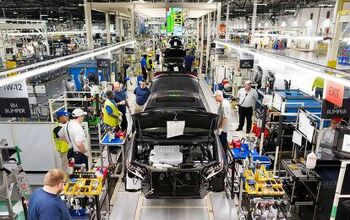Money-hungry States Lining Up to Tax Self-driving Cars (Just Like EVs)

There’s few things people living in the U.S. can agree on, but one of those things is the state of American road infrastructure. For the most part, it sucks. Eisenhower’s long gone, but his network of interstate highways, plus the spiderweb of two-lane roadways cross-crossing every corner of America haven’t grown better with age.
Meanwhile, the U.S. federal gas tax remains unchanged since its last hike in 1993. Still locked at 18.4 cents per gallon, the infrastructure funding shortfall created by the static federal tax is spurring states to pass their own gas tax increases. Michigan, California, and — controversially — New Jersey are among the most recent examples.
Still, boosting prices at the pumps only works if drivers still visit those pumps. What of the coming self-driving car wave, the vanguard of which are high-tech electric vehicles piloted by mere humans? Enter the taxman and his slim book of ideas.
Whether you choose to believe it or not, many predict autonomous vehicles becoming the norm one day. And, because our future robot world oozes eco-consciousness, those pilotless cars, whether they’re Fords or Chevrolets or branded with a name commonly associated with computers and mobile devices, will surely avoid gasoline and diesel at all costs.
Great for the environment, assuming the power grid’s clean. Awful for state and federal coffers. Regardless of what powers the vehicle (and who — or what — drives it), roads require frequent mending, and owners of gas-powered vehicles aren’t likely to take kindly to politicians proposing the double-tap taxation of gas taxes and road tolls to cover their zero-emission compatriots.
With this in mind, state lawmakers are already getting the jump on the potential robot pod revolution. Tennessee has already passed a law calling for a one-cent-per-mile tax (or “fee,” in government parlance) on self-driving cars. Autonomous trucks with more than two axles? 2.6 cents per mile.
In Massachusetts, proposed legislation calls for a 2.5-cent-per-mile tax on self-driving cars. Not quite as relaxing knowing there’s a meter’s running, is it? As the technology advances, other states are sure to follow. Still, the issue seems to be more about fossil fuel-free driving than human-free driving, and the resulting loss of tax revenue.
States are on top of that, too.
California’s hefty road repair bill, passed earlier this year, contains pain for all kinds of drivers. Besides increasing the state’s gas tax by 12 cents per gallon, the legislation raises vehicle registration fees and imposes a $100-per-year “fee” on zero emission vehicles (meaning both electric cars and the tiny smattering of hydrogen fuel cell vehicles). The EV tax goes into effect in 2020.
Elsewhere in the union, 16 other states have already enacted an electric vehicle fee to cover the gas tax shortfall. Some decided state-level tax credits or other taxpayer-funded EV incentives should disappear before applying a fixed charge. Georgia dropped its $5,000 tax credit in 2015, with a corresponding nosedive in EV sales. Across the Atlantic, Denmark saw a similar sale splunge.
Environmental advocates have slammed the imposing of EV fees, just as autonomous vehicle proponents aren’t too keen on the per-mile tax. John Maddox, president and CEO of the American Center for Mobility, an autonomous vehicle testing facility in Ypsilanti, Michigan, is calling for a national strategy on how to fun road repairs, rather than a piecemeal strategy that differs across state lines.
Should the federal government choose to not renew the $7,500 EV tax credit, automakers will quickly see what demand for EVs looks like when lawmakers treat them like ordinary vehicles. As for self-driving cars, when or if they take over our roads, it’s a sure thing that drivers and fleet operators won’t be spared from doing their civic duty — forking it over.
[Sources: CNBC, The Detroit News] [Image: 410(k) 2012/ Flickr ( CC BY-SA 2.0)]

More by Steph Willems
Latest Car Reviews
Read moreLatest Product Reviews
Read moreRecent Comments
- ToolGuy First picture: I realize that opinions vary on the height of modern trucks, but that entry door on the building is 80 inches tall and hits just below the headlights. Does anyone really believe this is reasonable?Second picture: I do not believe that is a good parking spot to be able to access the bed storage. More specifically, how do you plan to unload topsoil with the truck parked like that? Maybe you kids are taller than me.
- ToolGuy The other day I attempted to check the engine oil in one of my old embarrassing vehicles and I guess the red shop towel I used wasn't genuine Snap-on (lots of counterfeits floating around) plus my driveway isn't completely level and long story short, the engine seized 3 minutes later.No more used cars for me, and nothing but dealer service from here on in (the journalists were right).
- Doughboy Wow, Merc knocks it out of the park with their naming convention… again. /s
- Doughboy I’ve seen car bras before, but never car beards. ZZ Top would be proud.
- Bkojote Allright, actual person who knows trucks here, the article gets it a bit wrong.First off, the Maverick is not at all comparable to a Tacoma just because they're both Hybrids. Or lemme be blunt, the butch-est non-hybrid Maverick Tremor is suitable for 2/10 difficulty trails, a Trailhunter is for about 5/10 or maybe 6/10, just about the upper end of any stock vehicle you're buying from the factory. Aside from a Sasquatch Bronco or Rubicon Jeep Wrangler you're looking at something you're towing back if you want more capability (or perhaps something you /wish/ you were towing back.)Now, where the real world difference should play out is on the trail, where a lot of low speed crawling usually saps efficiency, especially when loaded to the gills. Real world MPG from a 4Runner is about 12-13mpg, So if this loaded-with-overlander-catalog Trailhunter is still pulling in the 20's - or even 18-19, that's a massive improvement.


































Comments
Join the conversation
Tax gas per gallon and electricity per kw/h. Done. It might even cause us to think a little more about the power we use at home. Very few people whine then they're electric bill is high, but add a little tax to it and they'll suddenly scream in horror and start working every little power saving scheme they can find.
"the infrastructure funding shortfall created by unlimited-term politicians siphoning money away from taxes that were meant to rebuild our roads and bridges" Fixed that for you.